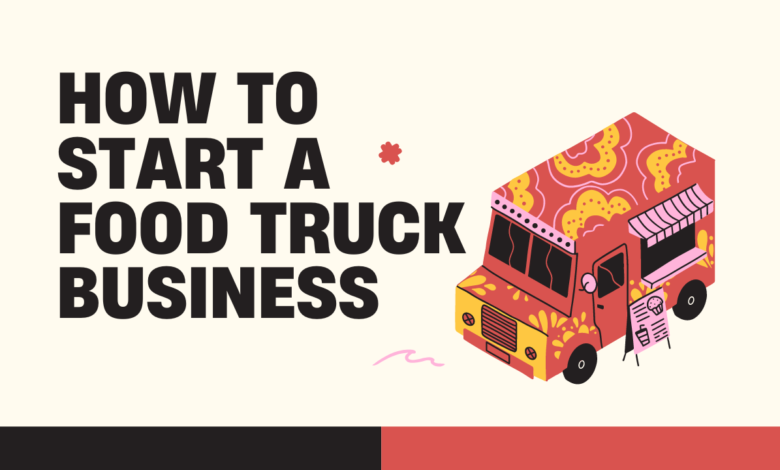How to Start a Food Truck Business

If you were looking for How to Start a Food Truck Business, your search ends here. Starting a food truck business is an exciting venture that offers flexibility, lower startup costs than a traditional restaurant, and the potential to reach a wide customer base. However, launching a successful food truck requires careful planning, research, and dedication. In this article, we will explore the steps involved in starting a food truck business, providing you with a comprehensive guide to help you confidently hit the road.
Research the Food Truck Industry
Before diving into the food truck world, conducting thorough research on the industry is essential. This will help you understand the market trends, competition, and customer preferences.
Understand the Market Demand
The first step in starting a food truck business is identifying the market demand. Research what types of food are popular in your target area and evaluate the competition. Are there other food trucks offering similar cuisine, or is there a gap in the market that you can fill? Understanding the preferences of your potential customers will help you tailor your menu and business strategy.
Study the Competition
Take the time to study the competition in the local food truck scene. Visit other food trucks, and observe their customer base, menu offerings, and pricing. This research will give you valuable insights into what works and what doesn’t in the industry. It can also inspire you to create a unique value proposition for your food truck that sets you apart from competitors.
Create a Business Plan for Your Food Truck
A well-thought-out business plan is crucial for the success of your food truck business. This document will serve as a roadmap, outlining your business goals, financial projections, and strategies for growth.
Define Your Concept and Target Audience
One of the first things you’ll need to determine is your food truck’s concept. Will you specialize in gourmet burgers, tacos, vegan meals, or fusion cuisine? Once you’ve defined your concept, think about who your target audience will be. Are you catering to busy professionals, families, or foodies? Understanding your target audience will guide your marketing efforts and menu design.
Outline Your Financial Plan
Starting a food truck business involves several costs, including purchasing or leasing a truck, equipment, licenses, and initial inventory. In your business plan, outline your startup costs and ongoing expenses. It’s also important to include revenue projections to ensure that your business is financially viable. Consider seeking advice from a financial advisor to help you create a realistic budget and funding plan.
Secure Necessary Licenses and Permits
Operating a food truck requires various licenses and permits, depending on your location. Failing to obtain the proper permits can result in fines or even the closure of your business.
Food Truck Permits and Licenses
The most common permits you’ll need include a food truck license, health department permits, and a business license. You may also need to pass health inspections to ensure your truck meets local health and safety standards. It’s essential to research the specific regulations in your area, as they can vary widely depending on the city or state.

Comply with Zoning Laws
Zoning laws dictate where food trucks are allowed to park and operate. Some cities have designated food truck zones, while others restrict food trucks from operating in certain areas. Make sure to familiarize yourself with local zoning laws to avoid any legal issues. You may also need to obtain parking permits or pay fees to operate in specific locations.
Purchase Your Food Truck and Equipment
The most significant investment for your food truck business will be the truck itself. Choosing the right vehicle and equipment is essential for smooth operations and long-term success.
Buying vs. Leasing a Food Truck
One of the first decisions you’ll need to make is whether to buy or lease a food truck. Purchasing a new or used truck can be a substantial upfront cost, but it gives you complete ownership. Leasing, on the other hand, can reduce initial expenses, but you’ll have to return the truck at the end of the lease term. Consider your budget and long-term plans when making this decision.
Equip Your Truck for Service
Your food truck will need to be outfitted with kitchen equipment such as grills, fryers, refrigerators, and prep stations. The equipment you choose will depend on your menu and cooking needs. It’s essential to invest in high-quality, durable equipment that meets health and safety standards. You may also want to hire a professional to help you design the layout of your kitchen for maximum efficiency.
Design a Menu for Your Food Truck
Your menu is one of the most critical elements of your food truck business. It should reflect your concept, appeal to your target audience, and be practical to execute in a c.
Keep It Simple and Streamlined
When designing your menu, it’s important to keep it simple and streamlined. A mobile kitchen has limited space and resources, so you’ll need to focus on dishes that are easy to prepare and serve quickly. Consider offering a few signature items that showcase your culinary expertise and can be made efficiently. This will help you keep up with the fast pace of food truck service while maintaining quality.
Source Fresh and High-Quality Ingredients
The taste and visual appeal of your food will be strongly influenced by the quality of your ingredients. Sourcing fresh, locally sourced ingredients can enhance the flavor of your food and attract customers who value sustainability. Build relationships with local suppliers and farmers to ensure you have access to high-quality ingredients at reasonable prices.
Develop a Marketing Strategy for Your Food Truck
For your food truck to succeed in drawing clients and developing a devoted following, marketing is essential. In the current digital era, success depends on having a strong online presence.
Utilize Social Media Platforms
Social media platforms like Instagram, Facebook, and Twitter are powerful tools for promoting your food truck. Regularly post updates about your location, daily specials, and upcoming events. Engaging with your followers and sharing behind-the-scenes content can help build a community around your brand. You can also use social media to announce special promotions or collaborations with other local businesses.
Attend Food Truck Events and Festivals
Participating in food truck events and festivals is an excellent way to gain exposure and attract new customers. These events often draw large crowds of food enthusiasts looking to try something new. By attending, you’ll have the opportunity to showcase your food to a wider audience and network with other food truck owners.
Manage Your Food Truck Business Operations
Running a food truck involves managing various aspects of the business, from staffing to inventory management. Effective management is crucial for ensuring smooth operations and long-term profitability.
Hire and Train Staff
If your food truck requires additional staff, it’s important to hire employees who are passionate about food and customer service. Training your staff to work efficiently in a fast-paced environment will help ensure that your customers have a positive experience. In a small food truck setting, teamwork is essential, so choose employees who can handle the demands of mobile food service.
Track Inventory and Finances
Managing inventory is critical to the success of your food truck business. Keeping track of your supplies will help you avoid running out of key ingredients or over-purchasing items that go to waste. Additionally, maintaining accurate financial records will allow you to track your expenses, revenue, and profit margins.
Conclusion
Starting a food truck business can be a rewarding and profitable venture for entrepreneurs passionate about food and customer service. By researching the industry, creating a solid business plan, securing the necessary permits, and developing a strong marketing strategy, you can set your food truck up for success. With dedication and hard work, you’ll be serving up delicious meals to happy customers in no time.




